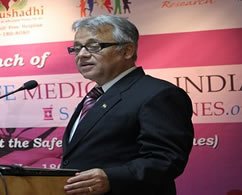|
 Technology to Target the Spurious Medicines Racket in India Technology to Target the Spurious Medicines Racket in India
 National News National News
 Global News Global News
 Drug Laws and Policy News Drug Laws and Policy News
 Pharma News Pharma News

News Archive
|
| |
Technology to target the Spurious Medicines Racket in India :

Bejon Misra, founder, Partnership for Safe Medicines India
The business in counterfeit medicines, estimated at a staggering $ 200 billion globally, not only poses grave dangers to consumers, it adversely impacts the reputation of the pharmaceuticals manufacturers whose brand names are counterfeited. It also erodes the earnings of the legitimate pharmaceutical industry. Bejon Misra of the Partnership for Safe Medicines argues that pharmaceutical companies spend billions of dollars on research and development, and when their profits are eaten into by counterfeit medicines, this hits the development of new medical formulations to combat perennially evolving drug-resistant strains of bacteria and viruses. Also, the higher costs of developing new drugs get to be passed on to the consumer, with the result that medical care becomes more expensive, he added.
In India, whose pharmaceutical industry is worth $12 billion and is projected to grow at least four fold in a decade’s time, the government is putting in place new initiatives to check the menace. This is important not only for the benefit of Indian consumers, but also for consumers of Indian manufactured medicines abroad. To cite a case in point, as much as 80% to 90% of anti-malarial and anti-retro viral drugs originates in India, according to Paul Lalvani, Dean, Empower School of Health. A system linked to scratch-off labels on medicines, by which a consumer can scratch off the coating on the label and text the number underneath to the service provider in order to ascertain if the medicine is genuine, has been approved by an Indian Ministry of Health appointed committee. A 2D barcode system, also approved by the committee, incorporates a code printed on the packaging of medicines. By means of this code, and using the cloud service tracking system, pharmaceutical companies can monitor where their products have reached in global supply chains.
In order to authenticate Indian medicines exported abroad through a track and trace system, the government has made it mandatory for exporters to print bar-codes on their tertiary (outer most) packaging, with effect from 01 October 2011. Bar coding on secondary-level packaging will be mandatory from 1 January, 2012 and on primary packing, from 1 July, 2012.
SOURCE: “Counterfeit drugs targeted by technology in India”, by Shilpa Kannan BBC News, Delhi.
|
| |
|
|
This Newsletter brought to you by


Former President of India, Dr.APJ Abdul kalam , addresses The National Consultation by PSM India :
NEW DELHI: Speaking at a National Consultation on Developing a Methodology for Study of Spurious Medicines , organised by Partnership for Safe Medicines (a not-for-profit organisation), former President Dr.A.P.J. Abdul Kalam stressed the need for drug controllers and inspection agencies to monitor instances of people who suffer adverse effects of spurious medicines.
Read More
Rs.6 lakh worth Fake Medicines seized:
KERELA : Drugs worth Rs. 6 lakhs have been seized by officials of the Assistant Drug Control office in Ernakulam, Kerala from a wholesale dealer in Kadavanthra, Kochi.
Read More
Online Pharmacy busted :
CHENNAI: An online pharmacy illegally supplying psychotropic drugs buyers in Europe and Canada was busted in a raid by the Chennai Zonal Unit of the Narcotics Control Bureau on 29 September, 2011.
Read More

Millions of Spurious drugs seized:
Unlicensed pharmaceuticals worth two million pounds were seized from the UK’s postal service and ports towards the last week of September 2011, with police confiscating another 200,000 pounds worth.
Read More 
Texting Mechanism promotes Consumer Confidence :
According to a report in the Boston Globe, Sproxil Inc., based in Cambridge, has introduced scratch-off labels in India, Ghana, Kenya, Tanzania and parts of South America.
Read More 


MSME to Provide Huge financial Assistance for barcoding adoption :
According to a notification issued by the Director General of Foreign Trade (DGFT), reference No. RE-2011/2009-2014, dated 10.1.2011, bar coding on all Indian pharmaceutical exports as part of a track and trace regime is obligatory with effect from 01 October, 2011.
Read More
Mandatory Prescriptions proposal by DCGI deferred by health Minister , not dropped :
A bid by the Drug Controller General of India (DCGI) to contain irrational antibiotic use, which is known to be a key factor in fostering anti-microbial resistance, has run into rough weather.
Read More
Essential Drug list Prices to be controlled
The price decontrol policies in the nineteen nineties is thought to have led to a 40% rise in drug prices between 1996 and 2006, according to a Planning Commission Expert Group.
Read More
Pharmacy Graduates get Good Standing certificates by Pharmacy Councils :
State Pharmacy Councils in India will give good standing certificates to holders of pharmacy degrees who are seeking to work abroad, according to a decision taken in an August 2011 meeting by the Pharmacy Council of India (PCI), a statutory body mandated to regulate pharmacy education and pharmacy-related practices.
Read More
|









 As per the notification issued by the Directorate General of Foreign Trade (DGFT), all exports of pharmaceutical products from India have to comply with these anti-counterfeit measures from July 1, 2011.
As per the notification issued by the Directorate General of Foreign Trade (DGFT), all exports of pharmaceutical products from India have to comply with these anti-counterfeit measures from July 1, 2011.